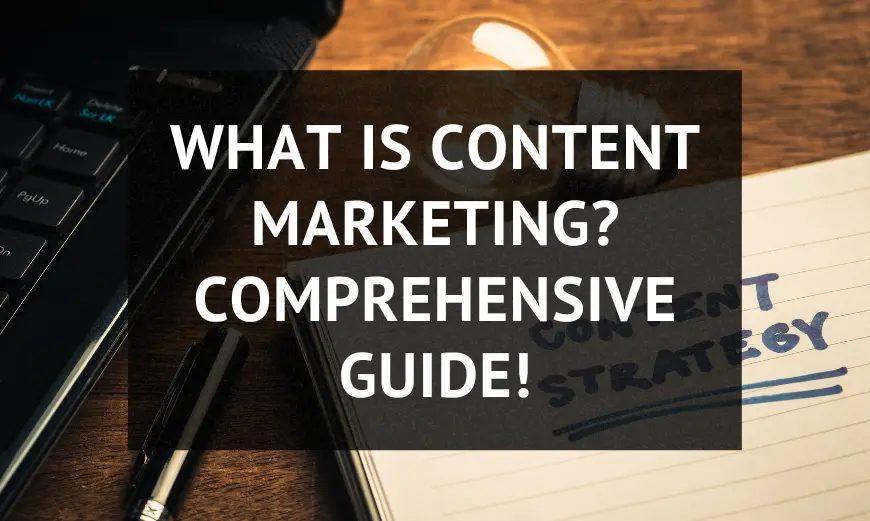Definition of Content Marketing
Content marketing is like having a chat with your audience, nurturing a bond over time. In the online world, a “piece of content” isn’t just a wordy article or a bright ad. It’s much more – think insightful blog posts, fun videos, or lively tweets. They educate, amuse, and relate.
In the past, traditional marketing was loud and attention-grabbing, like TV commercials or big newspaper ads that interrupted people’s enjoyment. But content marketing takes a different route.
Instead of hard-selling a product, it invites people in with useful information. It listens to their needs and offers answers. So, people feel understood and guided instead of feeling sold to.
As we dive deeper into this topic, we’ll uncover why this approach is a game-changer in the business world.
Why Content Marketing is Key for Businesses
Content marketing is more than just writing. It’s a powerful way for businesses to talk to people and make them feel connected.
Building Trust:
When a business shares useful information or tips, it shows they’re not just after sales. They genuinely care about helping. This kind-hearted approach helps people see the business as trustworthy. And trust? It’s the magic ingredient that turns visitors into loyal customers.
Attracting Visitors Without Paying for Ads:
Imagine having a shop and getting people to walk in without hiring someone to shout about your shop outside. Good content is like that. Search engines like Google love useful content, and they show it to people when they’re searching online. So, with great content, more folks can discover a business naturally without the business paying for each click.
Content That Works with Your Goals:
For content marketing to be super effective, it needs to tie in with what the business wants. Maybe the aim is to get more subscribers or perhaps to sell a new product. By creating content that lines up with these goals, a business can guide readers to take the exact action they want.
Making Friends Through Content:
Good content gets people talking and sharing. It’s like starting fun chats and building a club around your brand. Plus, businesses get to hear what folks really think.
Being The Go-To Expert:
Regular helpful content makes a brand the “smart friend” everyone goes to for advice in that field. This way, people trust the brand more and see it as a leader.
Long-lasting Benefits:
Unlike ads that stop when you don’t pay, quality content keeps working. Think of it as a gift that keeps giving. Once it’s out there, it can bring visitors and sales for a long time without extra cost.
Breaking Down the Types of Content Marketing
When we talk about content marketing, it’s not just about writing articles. Let’s take a look at the different types of content that businesses can use to connect with their audience:
Types of Content Marketing
Blog Posts: These are the building blocks for many. They’re articles that give insights, advice, or updates. They help in answering questions, providing news, or even sharing fun stories.
Infographics: Think of a colorful poster on social media that gives quick facts or steps in a fun way. That’s an infographic. It’s a great way to make information catchy and shareable.
Video Content: Not everyone likes to read. Videos are perfect for those who’d rather watch. It can be anything – tutorials, stories, or quick updates.
E-books and Whitepapers: These are like the deep-sea divers of content. They dive deep into a topic. While e-books can be guides or how-tos, whitepapers often give detailed research or findings.
Podcasts: It’s like radio but on the internet. People can listen to chats, interviews, or stories anytime they want. It’s becoming a favorite for many who like to learn on the go.
Case Studies: Have you ever heard the phrase “Show, don’t tell”? Case studies do just that. They show how a product or service helped someone. It’s a success story and can make others feel confident in choosing the business.
Email Marketing: It’s sending news or offers right into someone’s email inbox. But it’s not about spamming. It’s about sending useful stuff to people who’ve said, “Yes, I want to hear from you.”
Website Content: This is the basic information on a website, like the homepage, About page, and service pages. It tells visitors what a business is all about.
Each type has its strength. The trick is to figure out which ones fit best with the business and audience.
Building a Strong Content Marketing Strategy
Now that we know what content marketing is and the various content types you can use, let’s dive into how to make it really work for you.
Have a Solid Content Marketing Plan:
Just like you’d plan a trip, it’s crucial to have a detailed content marketing plan. Think of it as your roadmap or an editorial calendar. It tells you where you’re going, what kind of content you’ll produce, and when you’ll do it. A well-thought-out plan is fundamental in creating a content marketing strategy that ensures you’re always sharing high-quality content at the right time.
Know Your Audience:
Understanding your target audience is key. Have you ever heard of a “buyer persona”? It’s like an imaginary friend representing your potential customer. By understanding this persona – their likes, dislikes, pain points, and challenges – you can shape your content to feel like it’s speaking directly to them.
Don’t Just Create; Share:
Writing a great piece of content is just half the battle. Once it’s ready, amplify your content marketing efforts by sharing it! Think about it. If you made a delicious cake, would you hide it in the fridge? Nope! Promote your content on social media, email it to your subscribers, and maybe even use ads to get it in front of more eyes. The more people see it, the better your content marketing campaigns will perform.
Track and Adapt:
See how your content is doing. Are folks reading your blogs? Sharing your videos? Keep an eye on what’s working and what’s not. Then, make changes if needed. Just like you’d change a recipe to make it better, tweak your content based on feedback from your marketing team and audience. Use tools to gauge the performance of your content and adjust from there.
Moreover, It’s vital to keep tabs on your content’s performance. Utilize trusted tools like Google Analytics, SEMrush, and HubSpot’s analytics tools to get insights. Pair these metrics with recent industry benchmarks to understand where you stand. Continually refine your content based on these data-driven insights for optimal results.
Remember, content marketing isn’t just about making content. It’s about making content that fits your audience and then making sure they see it.
Boosting Content Marketing with Digital Marketing Strategies
Alright, you’ve got the basics down, but how do you take your content marketing to the next level? Let’s sprinkle in some digital strategies to supercharge your efforts.
SEO – Get Found Easily:
Think of SEO (Search Engine Optimization) as your content’s spotlight. It helps your content shine brighter on search engines. When you tweak your articles or posts using SEO, you’re making sure more people can find them when they search online.
Social Media Marketing – Share the Love:
Social media isn’t just for cute cat videos. It’s a powerhouse for sharing your content. Platforms like Facebook, Twitter, or Instagram let you post your content, engage with readers, and even run ads to promote it further.
Email Marketing – Straight to the Inbox:
It’s personal and direct. When you share your content through email, you’re sending it right into someone’s inbox. It’s like giving them a personal invite to read your latest post or watch your new video.
PPC – Paid Power:
Sometimes, it’s worth spending a little to reach even more people. PPC, or Pay-Per-Click, lets you run ads that showcase your content. Whether it’s on search engines or social media, PPC can boost your content’s visibility big time.
Web Design – Smooth Experience:
Imagine your content is a delicious meal. Web design is the plate and cutlery. A well-designed landing page ensures your audience can easily consume and enjoy your content without any hiccups.
By integrating these digital tools with your content marketing, you’re not just throwing content into the void and hoping someone sees it. You’re strategically placing it where your audience hangs out and making it irresistible for them to engage.
Picking the Right Content Marketing Service Provider
So, you’re ready to jumpstart your content marketing journey, but with so many providers out there, how do you pick the right one? Here’s a simple guide to help you make the best choice.
Identifying Needs – Get Aligned:
Before diving in, know what you want. Identify your content needs and make sure the agency you’re looking at matches those. They must align with your content goals and vision.
Dive into Their Content Marketing Portfolio:
Just like you’d glance at a book’s blurb before reading, skim through the agency’s case studies and content samples. It’ll give you a taste of their style, quality, and the kind of results they deliver.
Service Spectrum – More than Just Words:
Great content isn’t just about writing. Check if the agency offers a range of services, from SEO and social media marketing to even web design. A holistic approach ensures all aspects of content marketing are covered, giving your strategy the depth it needs.
Leveraging Expert Advice:
Finding the right partner is a lot of work to do. Fortunately, at WOWbix, we offer Content Marketing Services that cover all the strategies discussed in this article. Moreover, check out designrush.com’s article, “Jump-Start Your Digital Presence With the Right Content Marketing Agency.” It’s a great resource that can help you make a smart choice.
Customer Testimonials and Reviews:
Diving into the experiences of those who’ve already collaborated with an agency can be incredibly revealing. Please start with the agency’s website, as it’s likely they’ll showcase their most glowing testimonials there. But don’t stop there—expand your search to popular review platforms and forums for a well-rounded view. This way, you get an authentic feel for the agency’s capabilities, unfiltered, and from the people who matter most – their past and present clients.
Communication and Transparency:
In any partnership, staying in the loop is key. The right agency should be proactive about keeping you updated at every stage of your project. Expect them to welcome strategy discussions, be receptive to your input, and be candid about any potential challenges they foresee. This openness not only ensures you’re never caught off-guard but also fosters a strong foundation of trust between you and the agency.
Customization and Flexibility:
Your brand isn’t off-the-rack, so why should your content strategy be? The agency needs to appreciate the unique DNA of your brand. Instead of pitching a one-size-fits-all solution, they should be eager to tailor their strategies, aligning them with your brand’s distinct identity and objectives. After all, strategies molded to your brand are more likely to resonate with your audience, driving better results.
Cost-effectiveness:
While high-quality service is a non-negotiable, it shouldn’t burn a hole in your pocket. Seek an agency that strikes the right balance between offering stellar service and providing value for money. Transparency is key: every charge should be clear, with no hidden costs. Remember, every dollar spent on content marketing is an investment, so it’s vital to ensure you’re getting optimal returns.
Remember, content marketing isn’t just about producing content. It’s about creating a narrative for your brand. Ensure the agency you choose is not just a service provider but a partner in this storytelling journey.
Challenges in Content Marketing
Navigating the world of content marketing isn’t always smooth sailing. While it offers great opportunities, there are also hurdles to cross. Here’s a look at some common challenges marketers face.
Content Overload: In today’s digital world, there’s so much content everywhere, making it tough for yours to get noticed. How do you make sure your content stands out and remains relevant to your audience? It’s a big challenge!
Keeping Up with Algorithms: Search engines and platforms frequently update how they show content. It means that what works today might not work tomorrow. Staying updated with these ever-changing algorithms and tweaking your content strategy accordingly can be quite a task.
Measuring ROI (Return on Investment): How do you know if your content is working? It’s not always about immediate sales. Sometimes, content helps by making more people know your brand or by getting them to trust you more.
However, figuring out the real success of your content efforts can be tricky. It’s all about setting clear goals and knowing how to track them.
Conclusion:
Content marketing is more than just creating and sharing stuff online. It’s a well-thought-out approach to connect with people, answer their questions, and build their trust. When mixed with other digital methods like PPC or email marketing, its power skyrockets. For example, a catchy web design can hold your audience’s attention, but it’s the quality content that keeps them engaged and drives them to act.
From understanding what content marketing truly means to realizing its importance for businesses, we’ve traveled a long journey in this article. We’ve seen the various forms content can take, from blogs to videos, and how to make a plan that works. We also touched on how it fits into the broader digital landscape and how to pick the best team to help. Lastly, we can’t ignore the challenges; they remind us to be ever-adaptive and innovative.
In the end, remember this: Good content doesn’t just inform; it transforms. It doesn’t only build trust; it drives results. As you move forward, ensure your content speaks, resonates, and always delivers value.



